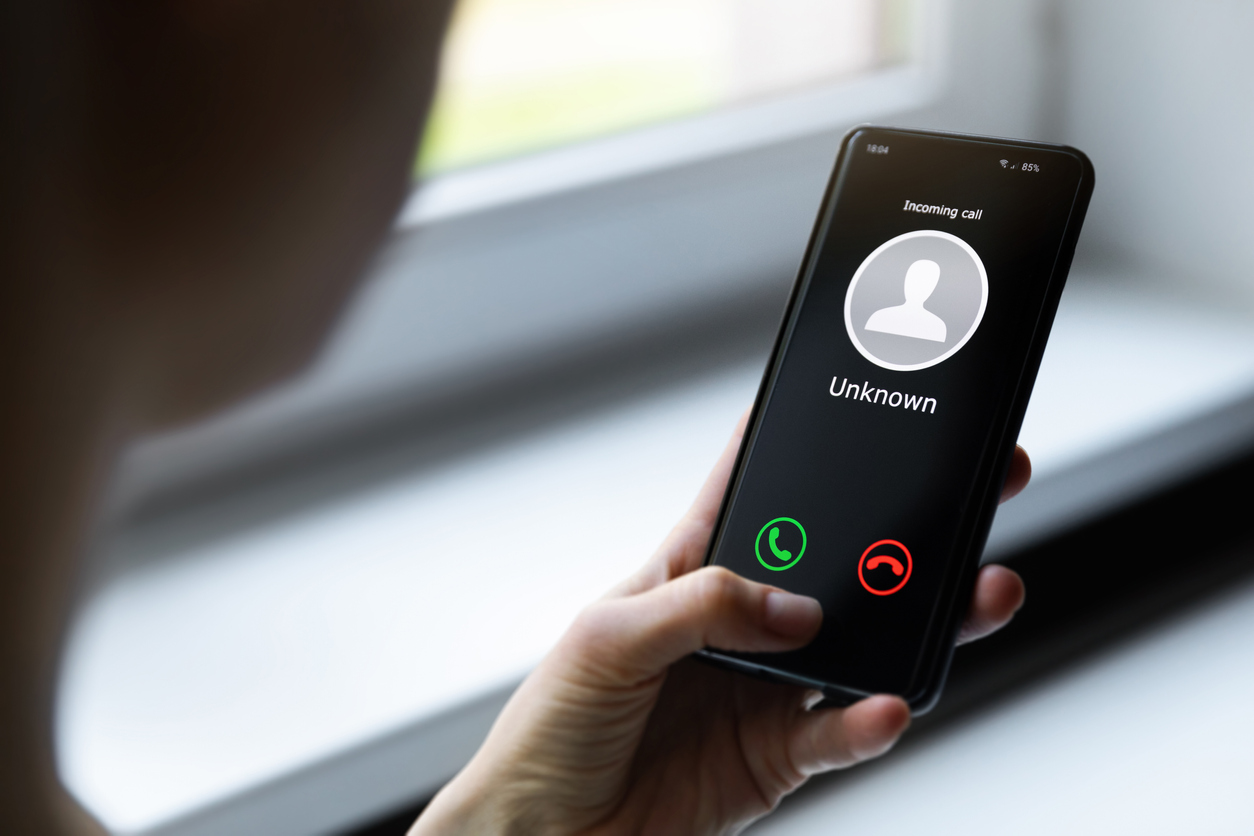If You Hear This When You Answer the Phone, Hang Up Immediately

In the era of overactive group texts and social media overload, getting a phone call from a friend or loved one with good news has become something of a special event again. Unfortunately, it’s also become next to impossible to figure out which incoming calls are from someone you actually want to speak to and not just another annoying robocall. And even though those anonymous spam calls might seem like they’re just a nuisance, they can actually be targeted scams that can put your personal information at risk. Thankfully, officials at the Federal Communications Commission (FCC) say there are a few simple tricks that can tell you when you should hang up the phone immediately—and others that can help cut back on unwanted calls altogether. Read on to see how you can spare yourself from having to cut the cord.
RELATED: If You Use This Popular Cell Service, Your Phone May Not Work Soon.
Hang up immediately if you hear a recording when you answer the phone.

Knowing you’re about to get a robocall is usually as easy as noticing that it’s coming from an unknown or blocked number. But if you ever answer the phone and hear a recording on the other end, you should hang up immediately—especially if it’s asking a simple question that you can answer with a “yes.”
According to the FCC, scammers and robocall companies often use simple responses to identify potential targets. And it’s not just your voice: This also includes asking you to press a button to remove you from a call list. Interacting with these prompts in any way is how spammers find out your number is real, which they can then use to begin spamming you more often or even sell to other companies, CNET reports.
Avoid picking up calls from unknown numbers, even if they appear to be local.

Screening your calls and avoiding unknown numbers can be difficult and annoying, especially if you’re waiting for an important call from someone whose number you might not have stored in your phone. But according to the FCC, even if a phone call looks like it’s coming from your area code, there’s a good chance it’s being “spoofed” to get your attention and trick you into picking it up.
Of course, if you ever answer the phone and realize you’re speaking with a live person instead of a recording, there are some other red flags that you should hang up immediately as well. If a caller claims to be from a company or government agency and immediately pressures you for personal information such as an account number, address, credit card number, social security number, or personal information such as your mother’s maiden name, it’s likely a scammer at work. The FCC recommends hanging up as soon as you become suspicious or unsure and then calling the purported company or agency back on an officially listed number or at a number listed on your bill or account statement.
RELATED: Apple Just Released This Warning About the Latest iPhones.
Recently released technology will make it harder for robocalls and spammers to flood your phone.

While choosing to hang up when you hear a recording or suspicious person can go a long way in cutting down on phone spam, recent changes adopted by major phone companies could already be cutting back on the number of unwanted calls flooding your device. CNET reports that as of June 30, all providers in the U.S. are required to use what’s known as Stir/Shaken technology, which stands for “secure telephone identity revisited” and “signature-based handling of asserted information using tokens.” The new tool allows phone companies to verify each call placed on their network, helping to reduce the number of fake or spoofed calls that make their way through to customers.
If you’re still looking to go the extra step to protect your phone from an onslaught of robocalls, there’s a good chance your mobile provider has other options to help screen for scammers. Verizon, AT&T, T-Mobile, and Sprint all offer apps or services that can help weed out spam. The FCC suggests contacting your phone company to see what’s available to you, as well as adding your number to the Do Not Call List to block telemarketers from bothering you.
For more useful information sent straight to your inbox, sign up for our daily newsletter.
Reporting spam text messages can help cut down on another major technological annoyance.

Unfortunately, scammers aren’t just bombarding your phone with calls: Spam text messages have also become a nuisance of modern times. And while blocking numbers may temporarily stop the unwanted texts from flooding your device, you can also use some official tools to slow them down overall.
If you ever receive a suspicious message claiming you’ve won a prize, offering a low or no interest rate credit card, promising to help you pay off student loans, or asking you for personal information in regards to bill payment, the Federal Trade Commission (FTC) warns against replying or clicking any links attached to the text. Instead, use tools within the messaging app to report the text and then copy and forward the message to 7726 (SPAM). Even with the new blocking technology in place, doing so will help regulators and phone companies spot and shut down scam rings faster and more efficiently.
RELATED: If You’re Charging Your iPhone Like This, Apple Says Stop Immediately.